
Ministry of Agriculture & Rural Development
CARD Project Progress Report
037/04VIE
Developing GAP systems
for dragon fruit producers and exporters
in Binh Thuan and Tien Giang provinces
MS2: FIRST SIX MONTHLY REPORT
August 2005

1. Institute Information
Project Name Developing GAP systems for dragon fruit
producers and exporters in Binh Thuan and
Tien Giang provinces
Vietnamese Institution Southern Fruit Research Institute
Vietnamese Project Team Leader Nguyen Van Hoa
Australian Organisation The Horticulture and Food Research Institute of
New Zealand
Australian Personnel John Campbell, Jim Walker
Date commenced 30 June 2005
Completion date (original) March 2007
Completion date (revised)
Reporting period Inception/First Progress Report
Contact Officer(s)
In Australia: Team Leader
Name: John Campbell Telephone: +64 3 528 9106
Position: Project Leader Fax: +64 3 528 7813
Organisation HortResearch Email: JCampbell@hortresearch.co.nz
In Australia: Administrative contact
Name: Mrs Leonie Osborne Telephone: +64 9 815 8819
Position: PA, Bioprotection Group Leader Fax: +64 9 815 4202
Organisation HortResearch Email: losborne@hortresearch.co.nz
In Vietnam
Name: Dr Nguyen Minh Chau Telephone: +84 73 893 129
Position: Project Champion Fax: +84 73 893 122
Organisation SOFRI Email: mch@hcm.vnn/vn
2

2. Project Abstract
Producers of dragon fruit in Vietnam have seen prices for their fruit decline by about 60%
since 2000, which can be attributed, in part, to their dependence on local and nearby
export markets. There are about ten major dragon fruit exporters in Vietnam but a
significant proportion of the total production is sourced from many small farmers. Returns
from dragon fruit could be significantly improved if small growers and exporters can gain
access to new high value markets in Europe and North America. Unfortunately, regulatory
requirements and recent consumer concerns over food safety and security mean that
Vietnamese growers can now only export to these high value markets if they have Good
Agricultural Practice (GAP) programmes in place. EUREPGAP is a comprehensive and
auditable GAP programme which is now the minimum fruit quality, safety and
sustainability standard required by most supermarket chains in Europe. This project will
develop the basis for EUREPGAP implementation amongst groups of dragon fruit
growers in Binh Thuan and Tien Giang provinces, to enable Vietnamese growers to
export dragon fruit to high value European markets. If successful it will also provide a
model GAP system for potential adoption by other Vietnamese fruit sectors.
3. Executive Summary
The delivery timing for the CARD 037/04VIE project Inception Report and First Progress
Report fall within one month of each other. As a result, this report combines both the project
inception and progress-to-date efforts.
HortResearch personnel made two visits to Vietnam in February and May 2005 during which
time the scope of the project was established. Contracts were developed and signed for project
implementation between Hassall and Associates International (HAI) and HortResearch also
Southern Fruit Research Institute (SOFRI) and HortResearch. A Memorandum Of
Understanding (MOU) and One Pager were developed and signed for the coordination of
various donor initiatives to improve Dragon fruit GAP production and export in Vietnam.
A change of Project Leader occurred for both HortResearch and SOFRI at project inception to
provide continuity of appropriate leadership for the duration of the project.
Implementation of the project has focused on establishing communication lines and the
benchmarking of 150 farmers in the Binh Thuan and Tien Giang provinces to evaluate current
dragon fruit production practices compared to those required under GAP. Some
benchmarking findings have been delivered through seminars to farmers.
Identification of a Binh Thuan province exporter, packer and farmer group to be the initial
“pilot” to receive project delivery was made during the benchmarking survey.
No major constraints to project implementation have been encountered at this stage. The
project is on track and milestones 1 and 2 are complete.
3

4. Introduction & Background
Objective 1:
To increase small holders’ competitiveness and capacity to supply dragon fruit to high-value
international markets, introducing new concepts of food safety, environmental responsibility,
sustainability and worker safety into their production practices.
Objective 2:
To provide technical support and training for Vietnamese extension/researchers to improve
their capacity in group training procedures for GAP implementation in dragon fruit.
The outputs expected include adoption of new practices that are required for entry into the
European market, and empowerment of small farmers to negotiate improved supply
arrangements. Vietnamese personnel from SOFRI, Department of Agriculture and Rural
Development (DARD) and the private sector will be trained in the field in Vietnam and two
SOFRI members will undertake a study tour to observe GAP systems in the fruit industry in
New Zealand.
It is intended that the development of the Vietnamese personnel, both in the public and
private sectors, will be through the practical application of:
• Establishing the current status of the dragon fruit industry against EUREPGAP standards
through a benchmarking survey
• Improving the current understanding of dragon fruit agronomy within SOFRI and
establishment of systems for constant improvement and problem solving
• The development of pilot models of EUREPGAP-compliant Exporter/Packer/Farmer
group in the field
• Establishing manuals, Codes of Practice and the development of training material that is
appropriate, user friendly, developed by the Vietnamese extensionists, and appropriate to
the dragon fruit industry for transfer to subsequent “models” and ultimately other crops
• Establishing the required quality systems for the dragon fruit industry to adopt and obtain
proof of the system robustness, by obtaining EUREPGAP certification for the pilot model
• Maximising the impact of current initiatives to develop GAP in the dragon fruit industry
through full participation in the Dragon fruit GAP Project.
5. Progress to Date
5.1 Implementation Highlights
There have been two visits to date by New Zealand project personnel (Drs Barbara Waddell
and Jim Walker in February, and Dr Waddell and John Campbell in May 2005) with the
purpose of scoping the CARD project and finalising the various contracts. Contracts now
signed include:
• CARD 037/04VIE Developing GAP systems for dragon fruit producers and exporters
in Binh Thuan and Tien Giang provinces; between Hassall and Associates
International and The Horticulture and Food Research Institute of New Zealand Ltd
(HortResearch)
4

• A Collaboration Agreement for the project between The Horticulture and Food
Research Institute of New Zealand Ltd and Southern Fruit Research Institute (SOFRI)
in Vietnam
• A Memorandum of Understanding to coordinate the dragon fruit development
initiatives (Dragon fruit GAP Project - DGP) in Vietnam between the parties:
HortResearch, Vietnam Competitiveness Initiative (VNCI), USAID/EGAT RAISE
SPS Project (RAISE/SPS) and SOFRI
• A Dragon fruit GAP Project One Pager information pamphlet.
The New Zealand Project Leader changed between the first and second visit from Jim Walker
to John Campbell. The second visit to Vietnam by the New Zealand team included
familiarisation for the replacement Project Leader. At the second visit the decision was made
to have two pilot demonstration EUREPGAP components developed through the wider DGP
collaborative agreement: a CARD Top Down (Exporter/Packer/Farmer group) and the
VNCI/IMO Bottom Up (Establishment of a Co-op Group of Farmers).
During the development of the Collaborative Agreement between HortResearch and SOFRI a
schedule of activities was developed, based on the Log Frame for the first year of the project.
As well as establishing SOFRI as the in-country Project Implementation Agency, the
following activities have either been completed or initiated:
• The benchmarking questionnaire was developed.
• The benchmarking questionnaire was tested in the field during the second
HortResearch visit.
• Agreement on the appropriateness of the questionnaire and training of SOFRI project
team was completed during the May visits to the field also.
• The SOFRI project team trained SOFRI Young Scientists in the method of
questioning farmers and recording questionnaire data.
• The extended SOFRI team subsequently completed the Benchmarking programme of
some 150 farmers in the Binh Thuan and Tien Giang Provinces.
• The benchmarking questioning of farmers was expanded by the SOFRI project team
to include questions on general agronomy, to gain a greater knowledge of the current
status of Dragon fruit production methods.
• Information collected on crop production methods has been collated and some aspects
delivered at farmer seminars – this will be ongoing as knowledge is accumulated.
• Benchmarking data collected was recorded in Vietnamese and subsequently
translated to English.
• HortResearch developed a database with web access for SOFRI to enter data.
• During the benchmarking recipients for the CARD project “Top Down Pilot” were
identified.
• A schedule of work during the New Zealand project leader’s second visit was
developed (Appendix 1).
• Communications within the DGP were established with fortnightly sessions by
internet telephone. These have been satisfactory between HortResearch and VNCI by
voice, but limited to written chat sessions with SOFRI. DGP coordination by Nguyen
Phuong Thao of VNCI has been established and is working well.
• Efforts to improve channels of communication between HortResearch and SOFRI
continue.
5




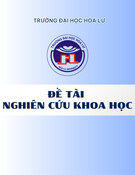
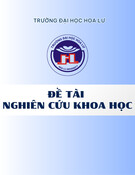
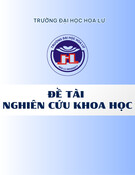
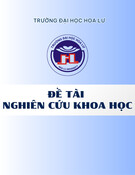
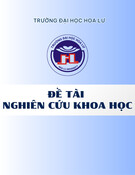
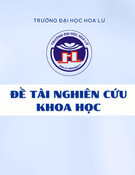
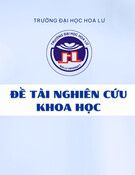








![Bộ Thí Nghiệm Vi Điều Khiển: Nghiên Cứu và Ứng Dụng [A-Z]](https://cdn.tailieu.vn/images/document/thumbnail/2025/20250429/kexauxi8/135x160/10301767836127.jpg)
![Nghiên Cứu TikTok: Tác Động và Hành Vi Giới Trẻ [Mới Nhất]](https://cdn.tailieu.vn/images/document/thumbnail/2025/20250429/kexauxi8/135x160/24371767836128.jpg)





